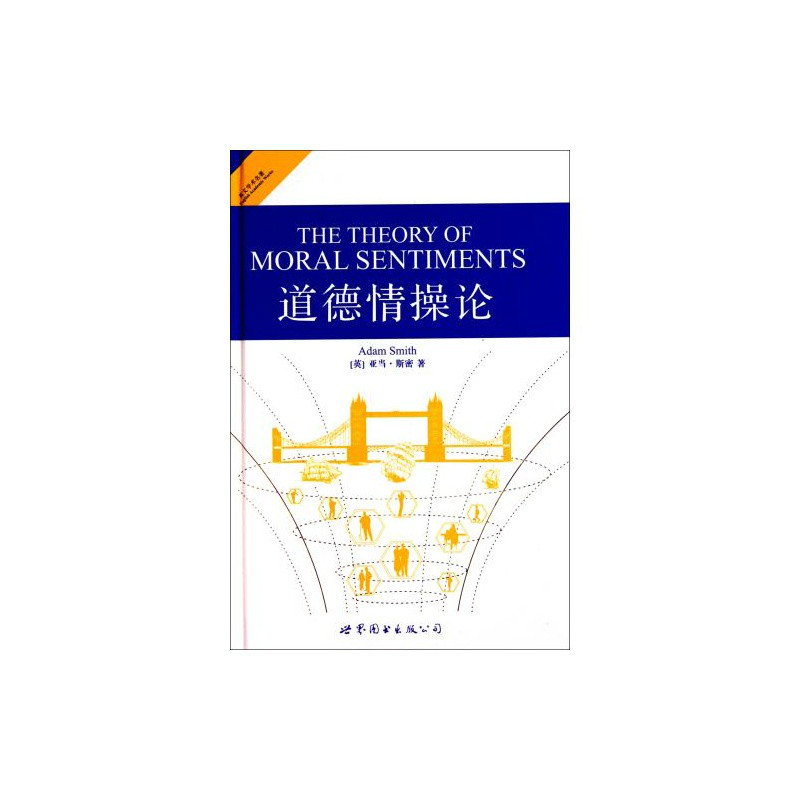《英文學術名著:道德情操論》是2011年1月1日世界圖書出版公司出版的圖書,作者是(英國)斯密。本書是亞當.斯密的倫理學著作,他一生中共修訂過六次。斯密從人類的情感和同情心出發,討論了善惡、美醜、正義、責任等一系列概念,進而揭示出人類社會賴以維繫、和諧發展的秘密。
基本介紹
- 書名:英文學術名著:道德情操論
- 頁數:289頁
- 出版社:世界圖書出版公司
- 裝幀:平裝
圖書信息,作者簡介,內容簡介,目錄,
圖書信息
第1版 (2011年1月1日)
叢書名: 上海世圖?名著典藏
正文語種: 英語
開本: 32
ISBN: 7510029066, 9787510029066
條形碼: 9787510029066
尺寸: 21.4 x 15 x 1.8 cm
重量: 299 g
作者簡介
作者:(英國)斯密
內容簡介
在《英文學術名著:道德情操論》中,斯密繼承了以《沉思錄》為代表的斯多葛學派的道德哲學思想,把“內心平靜”而不是“物質享樂”看作人生幸福的重要標誌,將人性中利他和利己這兩種本性有機地結合在一起,為之後出版的《國富論》奠定了道德哲學的基礎。《道德情操論》相比《?富論》給西方世界帶來的影響更為深遠,它對於促進人類福利這一更大的社會目的起到了更為基本的作用,是市場經濟良性運行不可或缺的“聖經”,堪稱西方世界的《論語》。
目錄
1 Part I
1.1 Of the Sense of Propriety
1.1.1 Of Sympathy
1.1.2 Of the Pleasure of mutual Sympathy
1.1.3 Of the Manner in which we judge of the Propriety or Im-
propriety of the Affections of other Men, by their concord
or dissonance with out own
1.1.4 The same Subject continued
1.1.5 Of the amiable and respectable Virtues
1.2 Of the Degrees of the different Passions which are consistent with Propriety
1.2.1 Of the Passions which take their origin from the Body
1.2.2 Of those Passions which take their origin from a partic-ular turn or habit of the Imagination
1.2.3 Of the Unsocial Passions
1.2.4 Of the Social Passions
1.2.5 Of the Selfish Passions
1.3 Of the Effects of Prosperity and Adversity upon the Judgment
of Mankind with regard to the Propriety of Action; and 'why it
is more easy to obtain their Approbation in the one state than
in the other
1.3.1 That though our sympathy with Sorrow is generally a
more lively sensation than our sympathy with Joy, it
commonly falls much more short of the violence of what
is naturally felt by the person principally concerned
1.3.2 Of the origin of Ambition, and of the distinction of Ranks
1.3.3 Of the corruption of our Moral Sentiments, which is oc-
casioned by this disposition to admire the rich and the
great, and to despise or neglect persons of poor and mean
condition
2 Part II
2.1 Of the Sense of Merit and Demerit
2.1.1 That whatever appears to be the proper object of grat-
itude, appears to deserve reward; and that, in the same
manner, whatever appears to be the proper object of resentment appears to deserve punishment
2.1.2 Of the proper Objects of Gratitude and Resentment
2.1.3 That where there is no approbation of the conduct of the
person who confers the benefit, there is little sympathy,
with the gratitude of him who receives it; and that, on the
contrary, where there is no disapprobation of the motives
of the person who does the mischief, there is no sort of
sympathy with the resentment of him who suffers it
2.1.4 Recapitulation of the foregoing Chapters
2.1.5 The Analysis of the Sense of Merit and Demerit
2.2 Of Justice and Beneficence
2.2.1 Comparison of those two Virtues
2.2.2. Of the sense of Justice, of Remorse, and of the conscious-
ness of Merit
2.2.3 Of the utility of this constitution of Nature
2.3 Of the Influence of Fortune upon the Sentiments of Mankind,
with regard to the Merit or Demerit of Actions
2.3.1 Of the Causes of this Influence of Fortune
2.3.2 Of the Extent of this Influence of Fortune
2.3.3 Of the final cause of this Irregularity of Sentiments
3 Part III
3.1 Of the Principle of Self-approbation and of Self-disapprobation
3.2 Of the love of Praise, and of that of Praise-worthiness; and of the dread of Blame,
and of that of Blame-worthiness
3.3 Of the Influences and Authority of Conscience
3.4 Of the Nature of Self-deceit, and of the Origin and Use of general Rules
3.5 Of the Influence and Authority of the general Rules of Morality,
and that they are justly regarded as the Laws of the Deity
3.6 In what cases the Sense of Duty ought to be the sole Principle
of our Conduct; and in what cases it ought to concur with other
Motives
4 Part IV
4.1 Of the Beauty which the Appearance of Utility bestows upon
all the Productions of Art, and of the extensive Influence of this
Species of Beauty
4.2 Of the Beauty which the Appearance of Utility bestows upon
the Characters and Actions of Men; and how far the Perception
of this Beauty may be regarded as one of the original Principles
of Approbation
5 Part V
5.1 Of the Influence of Custom and Fashion upon our notions of
Beauty and Deformity
5.2 Of the Influence of Custom and Fashion upon Moral Sentiments
6 Part VI
6.1 Of the Character of the Individual, so far as it affects his own
Happiness; or of Prudence
6.2 Of the Character of the Individual, so far as it can affect the
Happiness of other People
6.2.1 Of the Order in which Individuals are recommended by
Nature to our care and attention
6.2.2 Of the Order in which Societies are by nature recommended to our Beneficence
6.2.3 Of Universal Benevolence
6.3 Of Self-command
7 Part VII
7.1 Of the Questions which ought to be examined in a Theory of
Moral Sentiments
7.2 Of the different Accounts which have been given of the Nature of Virtue
7.2.1 Of those Systems which make Virtue consist in Propriety
7.2.2 Of those Systems which make Virtue consist in Prudence
7.2.3 Of those Systems which make Virtue consist in Benevolence
7.2.4 Of Licentious Systems
7.3 Of the Different Systems which have been Formed Concerning
the Principle of Approbation
7.3.1 Of those Systems which deduce the Principle of Approbation from Self-love
7.3.2 Of those Systems which make Reason the Principle of Approbation
7.3.3 Of those Systems which make Sentiment the Principle of Approbation
7.4 Of the Manner in which different Authors have treated of the
practical Rules of Morality

